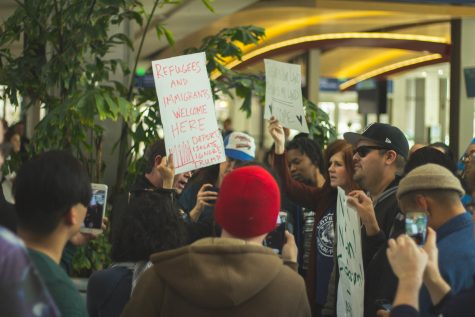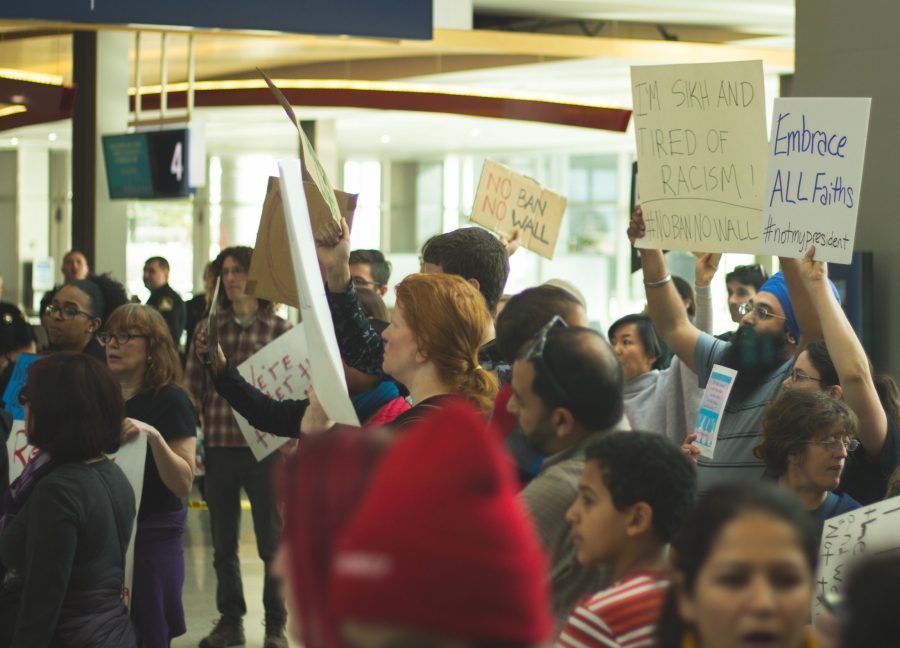Dozens of Sacramento State students are in the United States on visas and green cards from the seven predominantly Muslim nations affected by President Donald Trump’s executive actions on immigration, according to Director of News and Communications Elisa Smith.
“We have 65 students total,” Smith said in an email on Tuesday. “That includes those on F-1 visas (they are seeking a degree) and permanent residents (they have green cards).”
The school released a statement Monday that criticized the order, which banned travel to the U.S. from seven countries and suspended the admission of all refugees, leading to widespread confusion and detentions at airports nationwide over the weekend, including of green card holders.
“Sacramento State has students from the seven countries identified in the executive order who are studying here and may be affected by the immigration ban,” the statement said. “We are in the process of reaching out to all of them to make sure they are safe and accounted for, and we want to offer our support to them as members of the Hornet Family.”
The order came as Sac State’s undocumented students have been living under a cloud of uncertainty regarding their status in the U.S., in light of conflicting statements from Trump over Deferred Action for Childhood Arrivals (DACA).
CSU Chancellor Timothy White released a statement Monday signed by all CSU presidents, including Sac State President Robert Nelsen, criticising the order’s impact on higher education.
“When something threatens our ability to think beyond our borders and learn from the world as a whole, we will oppose it,” the statement said. “When something impacts anyone in our CSU community — especially the most vulnerable — it impacts us all.”
Sac State student Amer Tere was one of hundreds of people who attended a protest on Sunday at the Sacramento International Airport, one of many protests at airports nationwide.
“It was about standing upon the right side of history,” Tere said. “We must stand together against any injustice, no matter the victim, else we risk falling one by one to the tides of hate.”
Sacramento International has no flights to or from the seven nations covered under the migration ban (which are Syria, Iraq, Iran, Yemen, Sudan, Libya and Somalia), but Tere said that the protest was aimed at showing solidarity with people around the country.

“It was a symbolic moment in which (we) stood shoulder to shoulder with our sisters and brothers across the nation who fighting the greater fight at more important battlegrounds,” Tere said. “It’s not just about being in the right place in the right time, it’s about making that moment the right place and the right time.”
Sac State student Hemza Salem was also at the airport protest on Sunday. Salem’s parents immigrated from Libya — one of the seven countries singled out in the executive order.
“I didn’t expect that much of a crowd. My expectation was maybe 50 people, probably less. When I got there that wasn’t the case,” Salem said. “It was really relieving to see such a diverse group there. There were people from all walks of life. These people are probably not going to meet a refugee — but they believe in their rights.”
Salem said that he knows some people currently outside of the United States who are wondering if they can get back in.
“I know some people who want to travel back here and it depends if the ban stays or holds,” Salem said.
A Sac State student who came to the U.S. as a refugee from Qatar when he was 11 years old, said that the attitude of many Americans toward Muslims and refugees is “frightening.”
“There was a ban on the Jews coming in (in the 1930s). We’re literally repeating the same thing but people don’t seem to see that,” he said. “Pre-9/11, the paperwork and that system was very expensive and very difficult to get through. Post-9/11, I can’t even imagine how insane it’s gotten. It’s a very, very, very expensive multi-year process to do this, especially when you’re coming from a country that has war.”
The student said that he often is afraid for the safety of his mother, who wears a hijab in public.
“I’m totally scared for her all the time because you hear of people assaulting women in hijabs,” he said. “Every once in awhile she asks me for reassurance. ‘This is California, it’s not going to happen, right?’ ”
He said that while he knew many people who experienced anti-Muslim prejudice, he did not expect a Trump victory in the 2016 presidential election and hopes that the U.S. changes course.
“I think a lot of Trump voters are very smart people but he still used fear as this emotional weapon against them to change their perspective,” he said. “These refugees are coming here because they really have nothing left and this is their last chance. I hope people understand that. It was me. If I were in their situation now, I’d want somebody to take me in and I hope America does decide to bring them in.”
Undocumented students are awaiting news about whether President Trump will end DACA, a 2012 executive order that that has shielded hundreds of thousands from deportation, according to U.S. Citizenship and Immigration Services.
DACA, first instituted by former President Barack Obama, allows undocumented immigrants a two-year renewable deferment from deportation and allows them to obtain a work permit, provided that they meet certain requirements.
Among those requirements are that the immigrants came to the United States before they were 16, are in or have graduated from high school, have not been convicted of a “felony offense, a significant misdemeanor, or more than three misdemeanors of any kind” and do not “pose a threat to national security.”
About 665,000 people are or have participated in DACA, according to 2015 statistics from U.S. Citizenship and Immigration Services.
Sac State estimates that around 1,000 students are undocumented, according to Smith, but the school does not keep records on how many are DACA participants.
DACA did not not change immigration law — participants are still in the United States illegally. Immigration attorney Marcus Tang of the California Rural Legal Assistance Foundation described it as “prosecutorial discretion” during a presentation on campus on Jan. 23.
During the campaign, President Trump’s position was that DACA was an unconstitutional overreach of executive power and he said that he would end it “immediately.”
The uncertainty comes from mixed messages since his upset election victory. White House Press Secretary Sean Spicer suggested on Jan. 23 that ending DACA was not a priority for the administration.
“The president’s been very, very clear that we need to direct agencies to focus on those who are in this country illegally and have a record, a criminal record or pose a threat to the American people,” Spicer said.
On Jan. 25, however, Vox published a document purported to be a draft of an executive order “under consideration” by the administration that would end DACA. The purported order would prevent people from renewing their participation in the program, but would allow current work permits to last until they expire.
































































































































Janice • Feb 16, 2017 at 10:35 am
And when they say undocumented students, they mean ILLEGAL IMMIGRANTS. Call it what it is. Sacramento State, last time I checked, had standing room only attendance for many of it’s essential classes, and students were finishing years behind their original 4 year timeline. Why is it again, that student like myself (a California born citizen) have to compete with people who haven’t followed our immigration laws and are here illegally?
Not surprising CSUS would host something like this; it’s a liberal cesspool. Thank God for Jeff Sessions.